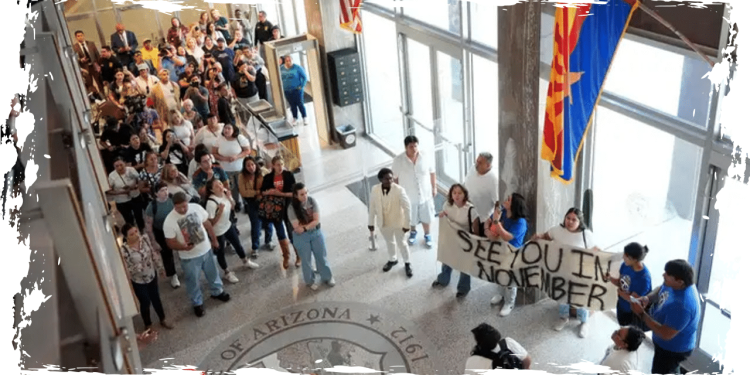Last week, the Arizona legislature, controlled by the GOP, approved a ballot measure that would grant state law enforcement officials the authority to arrest and detain individuals whom they suspect have entered the US unlawfully. Additionally, state judges would be allowed to deport them.
If voters approve the measure in November, it is highly likely to face legal challenges due to the high-stakes nature of immigration policy in the United States.
Come November, voters will have the chance to weigh in on several conservative-led measures, including one that has been opposed by Democratic Governor Katie Hobbs. It is worth noting that the Governor does not possess the veto power to stop the proposed measures from appearing on the ballot.
Republican lawmakers have found a way to bypass the governor’s power by exploiting a loophole that denies the governor veto power. This loophole helps the GOP to use their small legislative majorities to push conservative proposals onto the ballot.
The upcoming presidential election in this state is expected to be greatly influenced by these ballot measures. Both major-party candidates are eager to secure a win, and the outcome of these measures could potentially tip the scales in their favor.
In 2016, Arizona was won by Donald Trump, who defeated former Secretary of State Hillary Clinton. However, in the 2020 Presidential election, President Joe Biden emerged victorious in the state. His success was bolstered by the immense support he received from independent voters, Latino voters, and young voters.
Arizona’s ballot measures may have a significant impact on the upcoming November elections. In addition to the possibility of establishing the “fundamental right” to abortion until fetal viability, the proliferation of these measures could boost turnout in the state.
Arizona is poised to become a testing ground for the nation’s ideological struggles once again, which will not only affect the presidential candidates but also the down-ballot lawmakers.
Republican legislators have included a proposal on the ballot that would increase the level of difficulty for citizen-led signature drives to succeed in placing measures on the ballot.
The measure, if passed by voters, would impose geographic limitations on ballot petitions. Republicans argue that this is crucial to ensure that rural voters have a greater say in a state that is largely dominated by heavily populated Maricopa and Pima counties.
In Arizona, the law states that in order for a state statute to be included in the ballot, the petitioners must gather signatures equivalent to 10% of the votes cast in the most recent gubernatorial election. For constitutional amendments, the required percentage is 15% of the votes cast. Interestingly, the law does not specify any particular location or region where the signatures must be collected.
If approved by voters, the ballot measure proposed by the Republicans would enforce a signature distribution requirement for getting a measure on the ballot. This would mean that petitioners would have to meet the set thresholds in all 30 legislative districts of Arizona.
Read More:
- Police arrest kidnapper attempting to escape New Jersey via GW Bridge with a woman and child
- Tyler Perry’s Assistance is Sought by 50 Cent to Elevate G-Unit Studios

